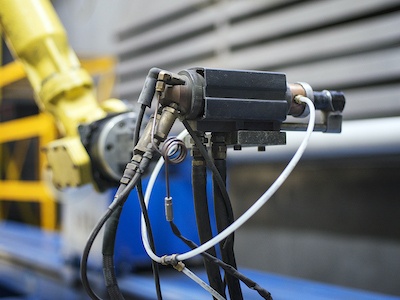As a manager, you watch the bottom line. The profit of your business is a driving force in its vitality and growth. Many industries — including oil and gas, automotive, food and beverage, and manufacturing — are only as productive as the efficiency of their machinery.
It is often more cost-effective to restore a high-dollar machine component rather than replace the part. This is especially true if these components are high-precision and are used in an abrasive or corrosive environment.
Instead of being replaced, these parts can be refurbished through thermal spray processes. The savings can create a major impact on your profit margin.
Excellent candidates for restoration are parts under high levels of stress, including worn bearing journals on a wide assortment of parts, fans turbine compartments, housings and impellers, mandrels, pump shafts, rotating and reciprocating parts, and other parts.
Educate yourself on the process of thermal spraying and the five types of thermal sprays that are best for industrial parts.
Why Thermal Spray Protective Coatings?
Thermal sprays increase resistance against erosion, abrasion, corrosion, and general wear. It is a versatile process that can be applied on a variety of substrates — from metals and alloys to plastics.
Coating materials such as carbides, ceramics, polymers, metals, and alloys are used according to the specifications of the order. This creates many advantages such as low toxic gas emissions, high deposition rate, and thick coatings. Consider these five types of thermal sprays that can be used on parts in your machines:
High Velocity Oxygen Fuel (HVOF)
When high-density protective metallic coatings are required, the High Velocity Oxygen Fuel (HVOF) is a highly-effective treatment.
- Appropriate when less than 1 percent porosity is required.
- Standard applications use tungsten carbide as a replacement for hard chrome.
- Provides resistance to abrasion, strength in bonding, and density that is durable.
High-Velocity Air-Fuel (HVAF)
High-Velocity Air-Fuel (HVAF) spraying applies high-quality coatings of metals, alloys, cemented carbides, and borides onto metallic surfaces. These coatings are produced in composite or pre-alloyed powders. The material is loaded into a spray gun, which combusts fuel gas and compressed air to generate a high-velocity jet. The jet produces a stream that is accelerated and heated. When the coating impacts a substrate, the coating is formed.
There are distinct advantages to this process:
- The combustion temperature of air-fuel mixtures is relatively low.
- The spray powder can be heated precisely to the desired temperature.
- Coatings are applied in “solid particle” spray mode, which creates well-bonded, dense coatings.
- The process creates resistance against abrasion, cavitation, corrosion, erosion, heat, and wear.
Plasma Spray
When extremely high temperatures are a consideration, plasma spray is an excellent choice. Plasma spray is used primarily in the area of ceramics for thermal barrier coating.
This type of coating is widespread in aircraft components and land-based turbines because of the higher-temperature threshold. However, there are many other applications that could benefit from the superior protection of plasma spray.
Metalizing: Twin Arc Spray and Combustion
Metalizing is primarily used when the resistance of aluminum and zinc are required. Metalizing is especially appropriate for the restoration of dimensions on miss-machined or worn parts. Ordinarily, these coatings are thicker than standard HVOF or plasma applications and utilize distinctly different alloys.
Spray and Fuse
Spray and fuse uses a spectrum of metallic coatings. These coatings are applied by combustion, and are fused either by high induction heat or in vacuum furnaces.
The advantage of this process is creating a premium metallurgical bond that melds into the substrate. This process is customarily used when there can be no spalling and zero porosity is required.
Utilize our Thermal Spray Coating Service
We provide several options for thermal spray coatings that fit the specific requirements of your job. Our team has deep understanding and knowledge of thermal spray processes that are best-suited for components used in your industry. We also employ cutting-edge application methods to ensure the highest-quality coating.
Instead of buying costly replacement parts, consider refurbishing critical components by utilizing our thermal spray coating process. We’ll help maximize your operating budget with direct bottom line impact.
Contact us today to discuss the best thermal spray option for your job and schedule our expert service on your industrial parts.

